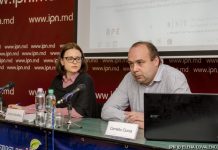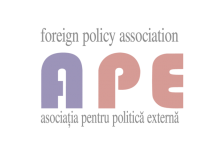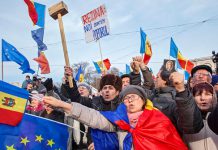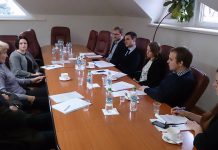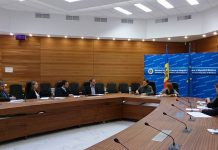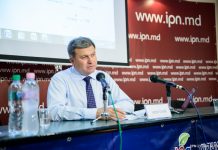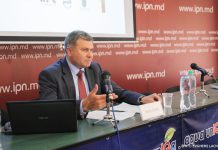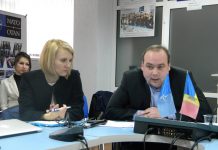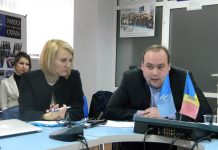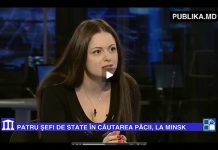APE staff
Press Conference: Chisinau should insist on idea of a˜common economic area with Tiraspol, expert....
(Română) The Moldovan authorities should insist on a ‘common economic area with the Transnistrian region, which would form part of the Association Agreement between Moldova and the European Union. This is one of the recommendations of independent expert Corneliu Ciurea, who analyzed the situation created after the Association Council decided to extend the Association Agreement so that this covered Transnistria too, IPN reports.
Counsil of the European Union:Joint Press Release following the second Association Council meeting between...
The European Union and the Republic of Moldova (hereinafter "Moldova) held today the second meeting of the Association Council under the Association Agreement. The EU and Moldova reconfirmed the common determination to implement their commitments to strengthening Moldova´s political association and economic integration with the EU.
ECONOMIC CHALLENGES OF UKRAINE AND MOLDOVA ON THE WAY TO EU.
The study is a result of the Capacity Building for Moldovan and Ukrainian NGOs to Assess the Economic Impact of Politically Motivated Actions project made possible by the re-granting mechanism of the Eastern Partnership Civil Society Forum, which includes assistance of the European Union and the National Endowment for Democracy.
Crisis in Moldova. A republic, if you can steal it. The Economist. 30.01.2016
IN 1918 the then three-month-old Moldovan republic gave up the struggle for survival and united with neighbouring Romania. It is a sign of how dire things are today, says Iulian Fota, a Romanian analyst, that people are talking about doing so again. Ever since 2014, when the embezzlement of about $1 billion from three banks forced a taxpayer bail-out that has crippled the economy, the country has been lurching towards collapse. Opposition supporters are permanently encamped in front of the government building. Maia Sandu, a former education minister who is rushing to build a new party, says the situation could lead to violence. No one seems to disagree.
VIDEO. Moldova și Lumea: Cadrul legal și practic de implementare al Legii privind asigurarea...
Asociația pentru Politica Externă (APE) în parteneriat cu portalul AGORA vă invită să urmăriți o nouă emisiune din ciclul „Moldova și Lumea”, o platformă de discuții ce își propune să analizeze subiecte de maximă importanță pentru politica externă și internă a Republicii Moldova.
Press Release, Communicating Europe” task force group meeting, Chisinau, December 10, 2015
In September 2015, the Foreign Policy Association of Moldova in partnership with Foundation Institute for Eastern Studies (Poland), Center for EU Enlargement Studies (Hungary), Research Center of the Slovak Foreign Policy Association (Slovakia), Association of International Affairs (Czech Republic), the Georgian Institute for Strategic Studies (Georgia), the Institute of World Policy and the financial support of the Visegrad Fund has launched a new project entitled V4 Supporting Communication Strategy of Moldova, Georgia and Ukraine on implementing AA and DCFTA” .
Press Release, Communicating Europe” task force group meeting, Chisinau, December 10, 2015
In September 2015, the Foreign Policy Association of Moldova in partnership with Foundation Institute for Eastern Studies (Poland), Center for EU Enlargement Studies (Hungary), Research Center of the Slovak Foreign Policy Association (Slovakia), Association of International Affairs (Czech Republic), the Georgian Institute for Strategic Studies (Georgia), the Institute of World Policy and the financial support of the Visegrad Fund has launched a new project entitled V4 Supporting Communication Strategy of Moldova, Georgia and Ukraine on implementing AA and DCFTA” .
Aid Coordination in Moldova: Politics Killing Policy
Leading up to the formation of Moldovas third government since elections a year ago, Chisinau faces not only political and macro-financial instability, but also suffers from a severe trust deficit in relations with external partners, some of which have suspended aid flows this year. If Moldova was once the most advanced Eastern Partnership state in terms of aid coordination, government ownership of the process has significantly weakened as a result of the protracted political crisis. Although donors continue to cooperate among themselves via well-established channels, participation by state institutions is currently limited. Once the political setting is stabilised, the government will need to go to great lengths to regain the trust of its external partners and re-establish donor coordination. This is fundamental if Moldova is to make the best use of assistance in order to recover its finances quickly.
Press release, Study Visit on Rural Development in Estonia, 19 și 24 October 2015....
During 19-24 October, the Foreign Policy Association (APE) in partnership with the Estonian Rural Network organized a rural development information visit to Estonia. The visit was aimed at studying Estonian best experience in implementing rural development policy.
Victor Chirila, Moldova și The Falling Star of the Eastern Partnership (EaP), APE/BST, 16.06.2015.
In the wake of the EaP Summit in Vilnius that took place on 28-29 November 2013, Moldova was considered the brightest star of the EaP. Its merits were evident. It initialed the Association Agreement (AA) including the Deep and Comprehensive Free Trade Aria (DCFTA) with the EU concluded successfully the visa liberalization dialogue with the EU and the European Commission recommended to the EU Council the lifting of visa requirements for Moldovan citizens who hold biometric passports. Five months later, on 28 April 2014, the EU has liberalized visa regime with Moldova, then, on 27 June 2014, Moldova signed the AA and started its provisional implementation on 1 September 2014. The prospects of Moldovas partnership with the EU were much more promising than ever before.
APE Policy Paper: The Transnistrian Settlement in Stalemate. APE/FEE. 25.05.2015
In 2014, the small-step policy of engagement with the Transnistrian administration has stalled. The consultations in the "5+2" format were discontinued and discussions on the political and security issues remained blocked. The sectorial cooperation between both banks has generally known no development. The joint working groups met without deciding anything substantial and their work agendas were dominated mainly by the conflicting issues. The situation in the security zone of the conflict continued to deteriorate, while the mutual recriminations between Tiraspol and Chisinau on sabotaging the dialogue have become increasingly common.
Victor Chirila: Towards a new European Neighbourhood Policy: A Moldovan perspective. APE/BST. 25.05.2015.
Moldova supports the ENP as a general policy framework for its members, nevertheless, it is pledging for a clear cut distinction between ENPs South and East dimensions, between the Eastern Partnership and the Mediterranean Union, between the European and non-European neighbours of the EU. Moreover, past five year have shown that even the Eastern Partnership is not a monolithic group of countries, on the contrary, its members have different level of ambitions when it comes to the scope and depth of their domestic reforms and their relationships with the EU. Therefore, Moldova is pledging strongly for a deeper differentiation including between the Eastern Partnership countries. In its view, the countries that have the will and determination to develop political association and economic integration relations with the EU, through implementing far-reaching democratic and economic reforms, should enjoy a clear cut European membership perspective.
Victoria Bucataru, Moldova still at the crossroads: Is the European path irreversible?”
Moldova still at the crossroads: Is the European path irreversible?” in The Di fferent Faces of "Soft Power": The Baltic States and Eastern Neighborhood between Russia and the EU/ Ed. by Toms Rostoks and Andris Spruds. și Riga: Latvian Institute of International Affairs, 2015. și 256 p., http://www.liia.lv/site/docs/LIIA_soft_power_book_web_layout.pdf"]
Moldova’s reunification will be possible only by broad compromise, declaration
(Română) Reglementarea conflictului transnistrean va fi posibilă doar prin găsirea unui compromis dintre toți participanții la procesul de negocieri în formatul 5+2, inclusiv cu Rusia. Doar Chișinăul și Tiraspolul nu vor reuși să ajungă la compromis. Declarația a fost făcută de Victor Chirilă, directorul executiv al Asociației pentru Politică Externă, în cadrul unui club de presă APE la IPN, la care a fost prezentat raportul „Reglementarea Transnistreană în Impas”.
Trends of the Eastern Partnership before Riga, Survey on Post-Vilnius Eastern Partnership, Visegrad Fund...
Association for International Affairs organized a public presentation of the final results of its unique research project focused on the Eastern Partnership Initiative at the Permanent Representation of the Czech Republic to the EU in Brussels on April 14. The key findings on Moldova were presented by APE research fellows Victoria Bucataru. The project was realized with the generous support of the International Visegrad Fund.
Trends of Eastern Partnership, Survey on Post-Vilnius Eastern Partnership, Visegrad Fund project
The aim of the research project Important, Forgotten, or Irrelevant? Stakeholders' Survey on Post-Vilnius Eastern Partnership” was to map the ideas, opinions and visions of important stakeholders coming from V4 member states and EaP partner countries towards the EaP initiative. Our respondents (politicians, diplomats, civil servants, analysts, NGO workers, journalists, and businessmen) answered 15 questions in areas relating to the up to now development of the EaP initiative, its principal benefits and shortcomings for the participating countries and its future prospects.
Corneliu Ciurea: The Neutrality of the Republic of Moldova in the Light of Ukraines...
Unlike Republic of Moldova, Ukraine never anchored the principle of neutrality in its Constitution, although it announced this intention in the 1990 Declaration of Independence. Ukraines experience in terms of neutrality is only limited to the period of 2010-2014, when Kiev passed a law regarding Ukraines non-adherence to military blocs și so called non-bloc status. After repealing of this law, Ukraine comes back to the idea of adherence to NATO, even though there is hardly any possibility for this idea to become reality in the near future, due to the war in the region. Observing Kievs fluctuations between a country with a neutrality status and the desire to come under the Western security umbrella, the Chisinau Government could draw some conclusions related to the functionality of the neutrality principle enshrined in Article 11 of the Constitution.
Corneliu Ciurea: Comparative analysis of options for assurance of national security of the Republic...
In this paper we will debate the main trends that revolve around this major cleavage - neutrality versus accession to NATO- in terms of the consequences of the Ukrainian crisis on Moldova. In our opinion, in this situation the idea of neutrality increasingly loses its sense. Moreover, the disappearance of previously accepted rules turns the neutrality into an almost hollow concept. However, the paradox of security insurance makes, despite continued erosion of its contents, neutralityto remain an indispensable concept from the view of necessity to reduce the risks. Any guidance in other direction, would lead to an unjustified increase of risks and threats for the Republic of Moldova.
EU budget support to Eastern Partnership Countries: Cases of Moldova, Georgia and Ukraine. Eastern...
The publication represents an evaluation which focuses on the EU budget support as an instrument of the EU funding to governments in three Eastern Partnership countries: Moldova, Georgia and Ukraine.
This Publication has been produced in the framework of the project "EU Budget Support to the Eastern Partnership Countries: Civil Monitoring and Evaluation", funded by the European Union and co-funded by the Sweden Government.


